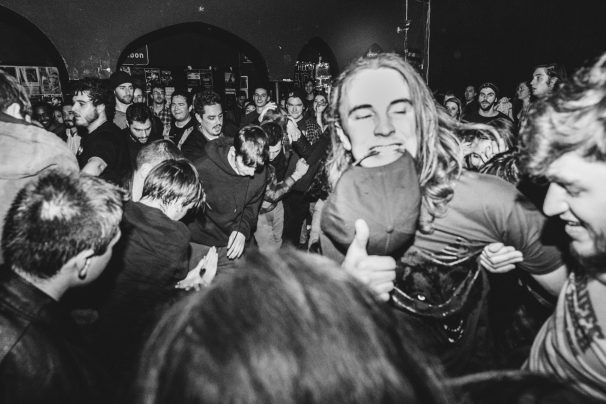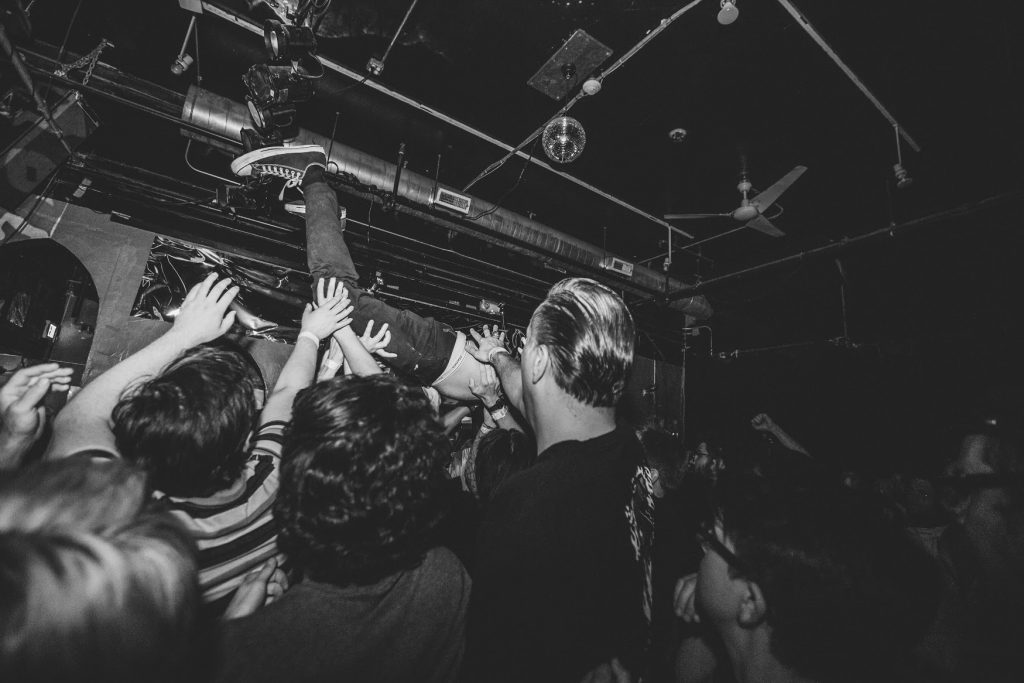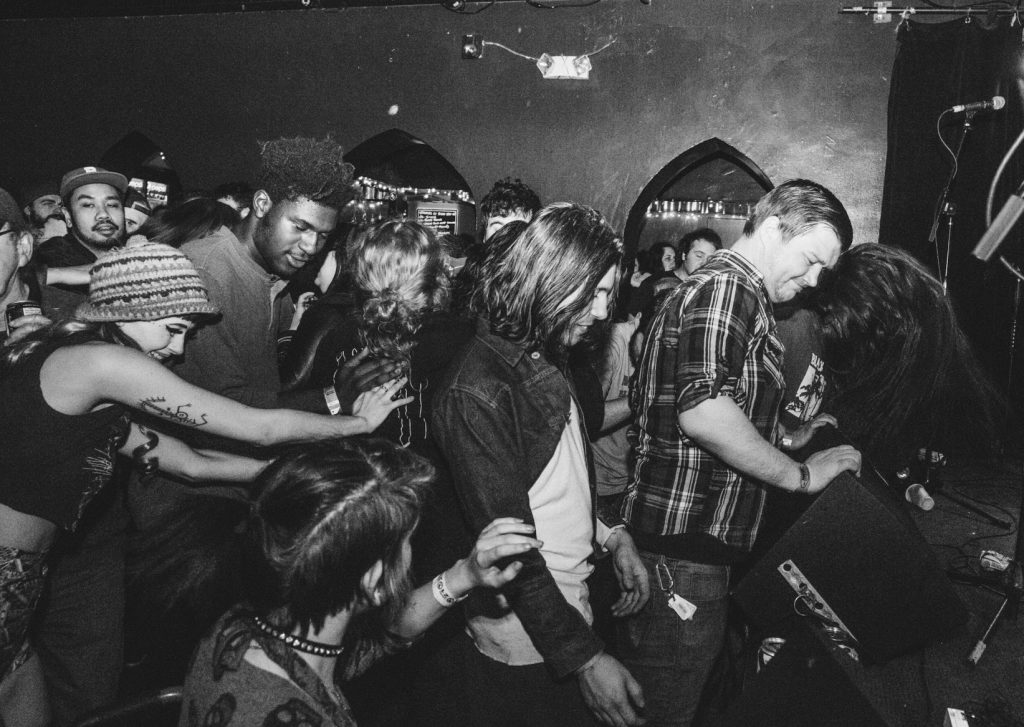
The headliner is this band from Philadelphia that sounds like Pavement; the main support, this band from New York that sounds like Pavement. The openers are these bands from Boston that sound like Pavement. Some may look at that and think, “how fitting.”
I look at it and get bored.
The truth of the matter is that most promoters don’t book mixed bills not because combining multiple genres doesn’t work, but because succeeding with a mixed bill takes work. When you get an all punk (or all folk, or all metal, or all synth pop, or whatever) lineup, you are catering to a specific crowd: the punks, the folkies, the metalheads, the people whose first thought when they hear “LFO” is Low Frequency Oscillator and not that boy band from the 90s who ripped off “More than Words” (whatever, I never wore Abercrombie & Fitch… make like a Kit Kat and give me a break.)
A single genre bill is surely an easier path to getting people in the door: you can put four punk bands the local scene has heard of on the bill and get the draw equivalent of one nationally touring punk band… but does this really help any of the bands? The ultimate aim of the headliner is to sell as much merch as possible; the ultimate aim of everyone on the undercard is to get in front of as many people as possible. Does uniformity allow these aims to be met every time?
 I’m not sure it does. When you cater to one genre group, most other people have already either seen the bands and know how they feel, or haven’t and might hesitate on seeing a bunch of bands they don’t know. This doesn’t help the undercard, and it might sell a few more tickets, but wouldn’t a good bill of mixed genres do the same thing? What’s more exciting: five similar sounding Pavement knockoffs or five good bands of different genres?
I’m not sure it does. When you cater to one genre group, most other people have already either seen the bands and know how they feel, or haven’t and might hesitate on seeing a bunch of bands they don’t know. This doesn’t help the undercard, and it might sell a few more tickets, but wouldn’t a good bill of mixed genres do the same thing? What’s more exciting: five similar sounding Pavement knockoffs or five good bands of different genres?
(Sorry, Stephen.)
There is obviously something inherently interesting about getting a funk band that local music fans enjoy, an acclaimed local songwriter, and a punk band that moves local punk fans together on one bill.
The trouble in that isn’t in the mixed bill, it’s in the excitement: if one (let alone more than one) band isn’t an act that makes people say “I want to see them live,” you could make the 30 or 40 people on the verge of going to the gig all decide not to. But on the other hand, if you get a mixed bill where every band is worth seeing and has at least reached an “I’ve heard of them” level in your area, you’re more likely to get everyone from all different groups to go.
A common trap without mixed bills is booking the same bands over and over: each scene only has a handful of bands with a legitimate draw, so those bands then tend to get all the gigs of that genre. The Local Alt Band opens up for all the Alt Bands, the Local Punk Band opens up for all the Punk Bands, the Local Folk Band opens up for all the Folk Bands, and so it goes. But this cuts off the other local bands from building up and having a draw themselves. One good way for local bands to work around this is to legitimately promote the hell out of their gigs, and even if no one extra shows up, odds are the promoters will still notice the work put in and try to get you on other gigs.
 What can’t happen on a mixed bill is any band being lazy. In 2017, every band posts on social media about their upcoming gig. That is the minimum a band can do. When a band complains that no one went to their gig and all they did was post on social media, you are hearing the music scene equivalent of a “nice guy” getting rejected by a woman and saying, “…but I was nice to her!” Congratulations, you did the literal bare minimum expected of you as a human. Maybe people would be more interested in your band if you posted flyers for your gig at other venues, went to enough shows that people knew you as a figurehead of the scene, gave out your demo for free until people listened, had some cool art around town or shirts that made people want to check you out, and/or if you blared your music until someone told you to turn it down (or turn it up).
What can’t happen on a mixed bill is any band being lazy. In 2017, every band posts on social media about their upcoming gig. That is the minimum a band can do. When a band complains that no one went to their gig and all they did was post on social media, you are hearing the music scene equivalent of a “nice guy” getting rejected by a woman and saying, “…but I was nice to her!” Congratulations, you did the literal bare minimum expected of you as a human. Maybe people would be more interested in your band if you posted flyers for your gig at other venues, went to enough shows that people knew you as a figurehead of the scene, gave out your demo for free until people listened, had some cool art around town or shirts that made people want to check you out, and/or if you blared your music until someone told you to turn it down (or turn it up).
There are a million ways to promote, but in person seems to be the best way. When bands merely tweet and post on Facebook, they’re not necessarily doing any work that will make anyone want to book them again. When a promoter books a mixed bill, they need bands that will promote in the real world; with a single genre bill, one or two slackers can pass.
Same goes with the promoter themselves. If you book Pile, Speedy Ortiz, Kal Marks, and a local rock band no one’s heard of, that show is going to do well whether the promoter does any work or not. It’ll take a bit of work to combine Speedy Ortiz with a cool punk band and a folk act people have been talking about, but a little bit of work will go a long way – the work is required though.
Mixed bills can actually help build smaller, unheard-of bands better than one-genre bills can. Until a band has a draw – its own brand and core identity figured out – every band should be trying to play in front of as many different audiences as possible. You might be a metal band, but you might be a metal band that only punks like because your lyrics are more political. You might be a soul act, but you might be a soul act that only prog rock fans dig because you write in weird time signatures. You might be a singer/songwriter, but you might be a singer/songwriter only metalheads like because all of your lyrics praise Satan. (If that’s the case, please email me your Bandcamp.) Bands will never know until they’re already there and any act who says otherwise is kidding you.
With all of that said, I’ll always expect most shows to be one-genre shows… and that’s okay. But I don’t aim for any of the shows I book to be that way. When I think of my favorite moments in music, I think of when Jelani Sei, an emo-funk group, opened up for Slingshot Dakota at a pizza shop, or when Pile played with math rock band Giraffes? Giraffes! in Western Mass, or when I got to play a show with both Mal Devisa and Animal Flag.
Combining different genres can literally be a mixed bag. But when every act is different, every act is more memorable. That helps the promoter, that helps the bands, and that helps the show. It just takes work.

Dan Bogosian is a full time musician, freelance writer, and part time promoter in Connecticut. He plays bass and guitar in Connecticut rock band Spillway, keyboard and synth in Boston punk act Fightsong, and bass in garage rock band Ruckie. His bylines include GQ, Pitchfork, and now Allston Pudding… obviously.
